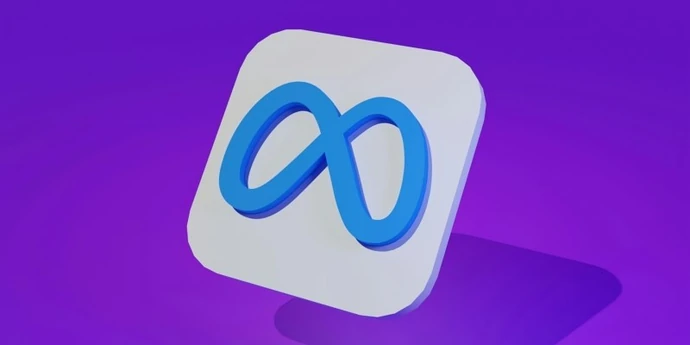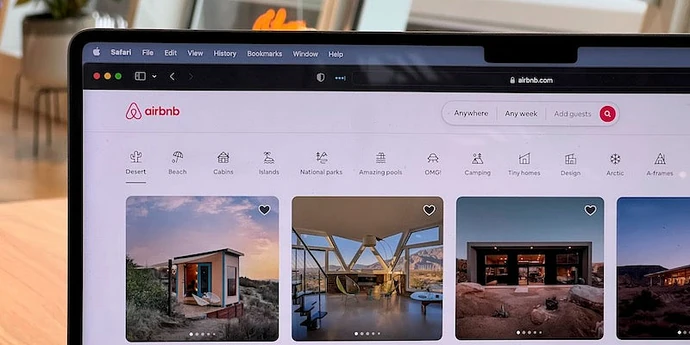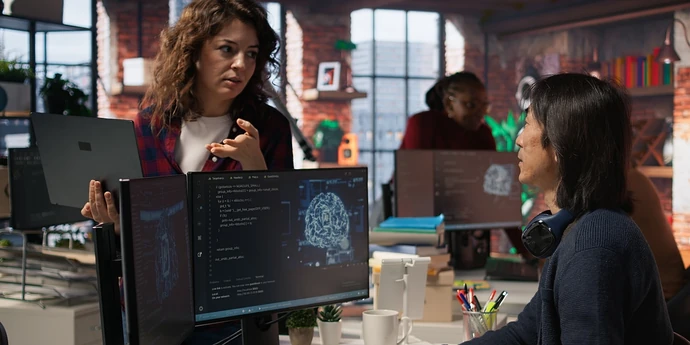In this guide, we’re going to cover everything you need to know to prepare for product manager (PM) interviews at Capital One.
Capital One product manager interviews are extremely competitive. Aside from challenging case interviews, you’ll face in-depth questions over the course of roughly five to six interview rounds.
Thankfully, the right preparation makes all the difference. To put together this guide, we’ve scoured the internet for interview reports from real Capital One PM candidates, researched the interview process, and sourced insights from ex-Capital One experts.
Below, you’ll find a detailed breakdown of the company’s hiring process, some real sample interview questions, interviewing tips, and essential prep resources that maximize your chances of success.
Here’s an overview of everything we’ll cover:
Click here to practice 1-on-1 with Capital One PM coaches.
1. Capital One product manager role and salary ↑
Before we cover your PM interviews at Capital One, let's take a quick look at the role itself.
1.1 What does a Capital One product manager do?
In the company’s own words, a Capital One product manager “reimagines the status quo and drives sustainable customer experience through technology.”
As a Capital One product manager, your job is to identify customer problems and define product vision. You’ll create, design, and propel technology-enabled innovations forward across Capital One’s core businesses. This includes cards, banking, lending, and internal platforms.
Capital One’s PM roles can operate in varied areas, ranging from Airport Lounge (Premium Products and Experience), Business Cards and Payments, Card Data, Deployment Pipelines, to Enterprise Financial Platforms, and more.
In practice, a Capital One PM:
- Partners closely with engineering, design, data, and business teams to turn customer needs and business goals into well-defined product requirements
- Owns the product roadmap, including feature prioritization and trade-off decisions
- Defines success metrics and evaluates product performance to inform iteration and improvement
- Works on both customer-facing products and internal tools that improve operational efficiency and scale
The role places a strong emphasis on data-driven decision-making and experimentation. PMs are expected to ground product decisions in analytics, testing, and measurable impact, rather than intuition alone.
You’ll regularly define KPIs, evaluate trade-offs, and assess whether a solution is desirable for customers, viable for the business, and feasible to build and scale.
Based on Capital One product manager job descriptions, the role typically requires the following core competencies:
- Product strategy and ownership. Defining product vision, setting a roadmap, and owning outcomes end-to-end
- Customer-centric thinking. Deeply understanding customer needs and translating insights into product solutions
- Data and analytical skills. Using metrics, experimentation, and analysis to inform decisions and measure success
- Cross-functional leadership. Working closely with engineering, design, data, and business teams to execute
- Execution in regulated environments. Delivering products in a highly regulated financial services context while managing risks and compliance constraints
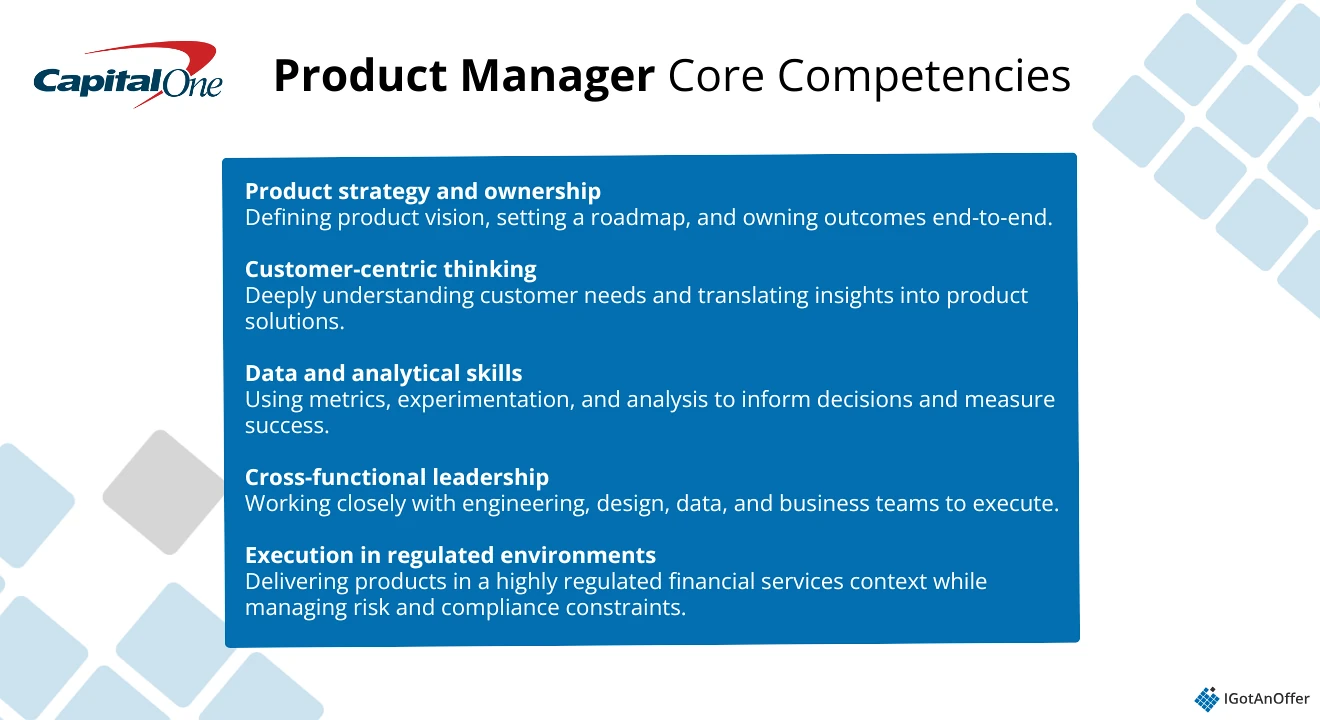
Interviewers will look for examples of clear communication, thoughtful decision‑making, and principled execution. As a Capital One PM, your success is measured not just by what you build, but by how responsibly and effectively you build it.
1.2 What skills are required to be a Capital One product manager?
To be considered for a product manager role at Capital One, candidates typically need a combination of product experience, business and technical acumen, and strong interpersonal skills. Based on recent Capital One PM job listings, common requirements include:
- Bachelor’s degree (often in business, engineering, or quantitative fields); advanced degrees like an MBA are a plus
- 2+ years of product management or related experience; experience in financial services or technology is advantageous
- Experience defining product strategy, owning a roadmap, and delivering measurable outcomes
- Ability to work cross-functionally with engineering, design, data, and business teams
To be a cuccessful Capital One PM, you need to demonstrate strong analytical and problem-solving skills. You also need to have a customer-focused mindset, using data and empathy to make decisions that benefit both end users and the business.
1.3 Capital One’s product framework
Capital One looks for product manager candidates who are intellectually curious, communicators and influencers, learners, doers, passionately customer-focused, and team players.
As a Capital One PM, you’re expected to be proficient in Capital One’s product framework of key qualities, which are specified in their job posts:
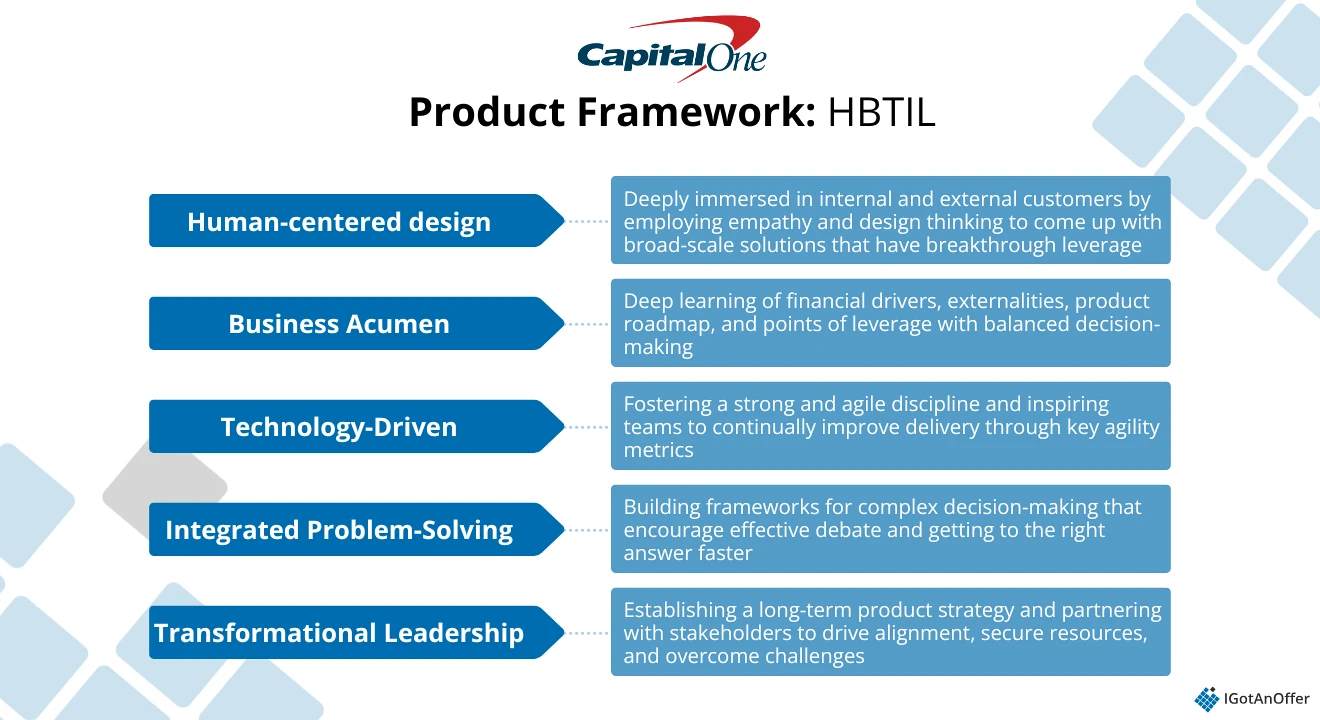
Capital One was founded on the belief that information and technology could transform banking.
Product managers are expected to create solutions that meet customers’ evolving needs while continuously improving their experience. This requires a strong customer focus, guided by Capital One’s product framework, so PMs can innovate, solve complex problems, and drive impact across the business.
1.4 How much does a Capital One Product Manager make?
Based on Levels.fyi’s 2025 data, the median total compensation for a Capital One product manager in the United States is approximately $207K per year, including base salary, bonus, and any stock grants. The median base salary for PMs is around $178K–$189K.
As of late 2025, here are the average salaries of the different product manager levels at Capital One, based on Levels.fyi data.
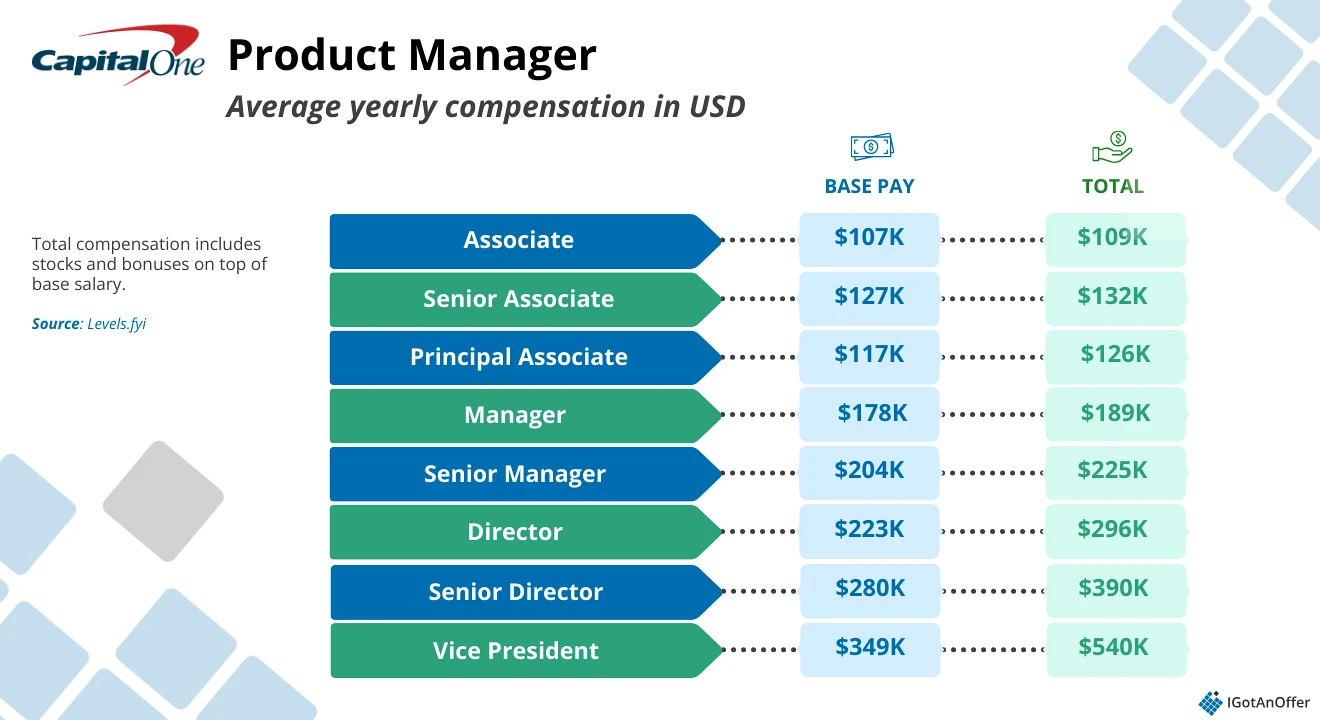
Location also plays a part in the difference in salary. For example, see how the total compensation figures for PMs vary across different Capital One locations below:
- New York PM: $200K
- Northern Virginia, Washington, D.C.: $124K
- Greater Chicago Area: $168K
- San Francisco Bay Area: $223K
- Greater Dallas Area: $160K
Ultimately, how you do in your interviews will help determine what you’ll be offered. That’s why hiring one of our product manager interview coaches can provide such a significant return on investment.
Remember, compensation packages are always negotiable, even at Capital One. So, if you do get an offer, don’t be afraid to ask for more. You can prepare ahead by reading our product manager salary negotiation guide.
If you need help negotiating, consider booking one of our salary negotiation coaches to get expert advice.
2. Capital One product manager interview process and timeline ↑
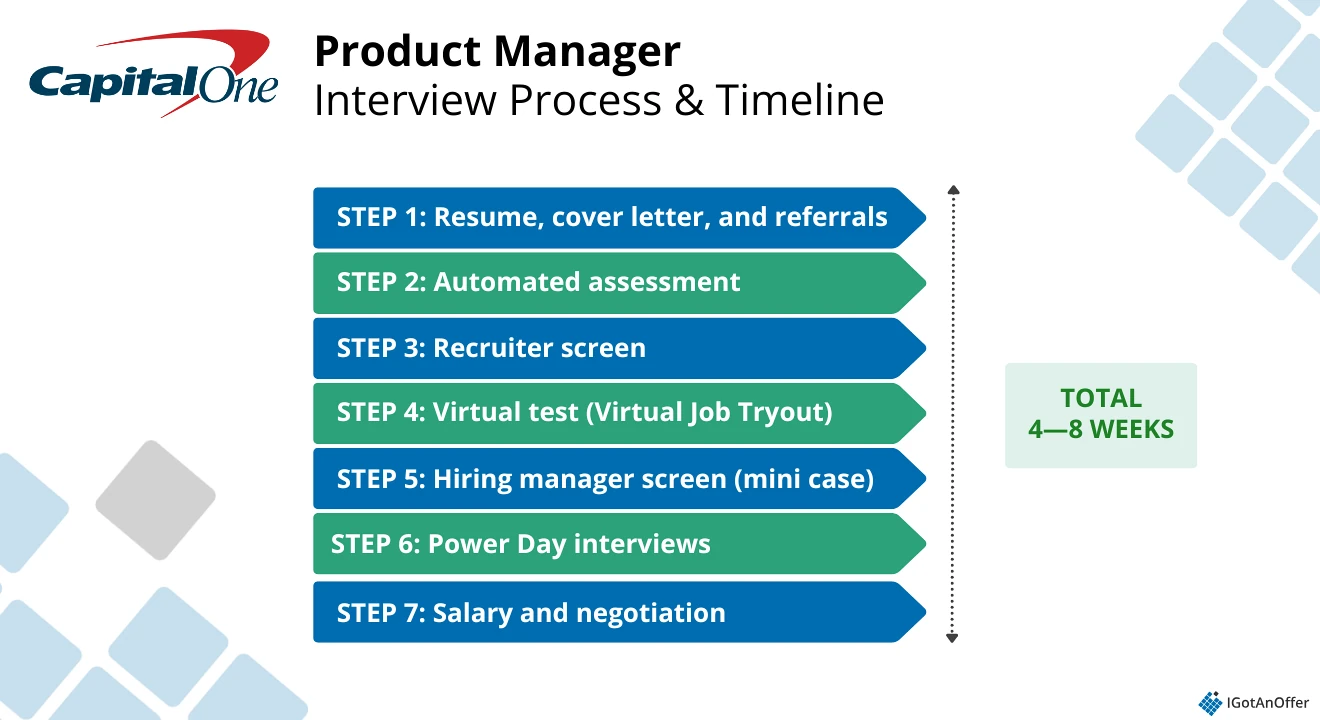
This section mainly discusses the interview process for the Capital One product manager role, but it also applies if you’re going for a Capital One product management internship or an Associate Product Manager role.
The interview process for Capital One PMs generally takes four to eight weeks to complete.
Here’s a quick overview of the steps you may face along the way:
- Resume, cover letter, and referrals
- Automated assessment
- Recruiter screen
- Virtual test (Virtual Job Tryout)
- Hiring manager screen (1-hour mini case interview)
- Power Day interviews
- Salary and negotiation
Now we’ll cover each of the steps we listed above in more detail, so you can get a better idea of what to expect and how to prepare.
Step 1: Resume, cover letter, referrals ↑
Step one is getting the interviews. For that, you’ll need a quality resume tailored to both PM positions and Capital One, specifically.
Once you find a role you’re interested in and have determined that you meet all Basic Qualifications (BQs), you’ll start your application by submitting some basic information. You’ll then be prompted to complete your full application in Workday, according to Capital One’s career FAQs.
As with most companies, getting an employee or contact at Capital One to refer you to the recruiting team can also be helpful. In our experience, the most straightforward way to do this is to directly contact Capital One employees you share connections with on LinkedIn.
Do note that cover letters are not required for any roles and will not be reviewed as part of your application, according to Capital One’s UK-based early career website.
If you have yet to apply, you can optimize your documents by using our product manager resume guide.
If you’re looking for expert feedback, you can also get input from our team of expert recruiters, who will cover what achievements to focus on (or ignore), how to get more impact from your bullet points, and more.
Step 2: Automated assessment ↑
The first step of Capital One’s interview process is the automated assessment. The purpose of this step is to filter out the initial pool of applicants and evaluate basic competencies relevant to the role.
This may include skills like:
- Communication
- Leadership
- Problem-solving
- Customer focus
On average, the online assessment tests take 20 to 45 minutes to complete.
However, it’s unclear whether or not this assessment is given to every single applicant. It may depend on the exact role you’re applying for, but it wouldn’t hurt to be prepared in case it does come up.
If you pass this round, you’ll be contacted by a recruiter to review your assessment experience and discuss the next steps.
Step 3: Recruiter screen
The next step is the recruiter screen. This will typically be a brief 30 to 45-minute call wherein your recruiter will discuss further details about the company and role. The purpose of this interview is to assess your fit. Expect to be asked behavioral questions during this stage.
This list of 23 common interview questions by Capital One is a good resource to review more example questions for practice.
If you pass this step, you will then move on to the more in-depth portion of the process, which includes a take-home challenge for some roles and longer interviews.
If you’re unsure about what steps are ahead in the interview process, take this opportunity to ask any clarifying questions about what you can expect. The recruiter will be your point of contact for the rest of the interviews.
Step 4: Virtual test (Virtual Job Tryout) ↑
Depending on the specific PM role you are applying for, you might also be asked to complete an hour-long Virtual Job Tryout.
This test will assess your role-related knowledge: how you manage projects, teams, and relationships, how you troubleshoot problems, and how you work through business cases.
Here are examples of the general modules you’ll encounter as a product manager, according to this Reddit thread and based on Capital One’s Career FAQs:
- Manage relationships: Make decisions and respond to scenarios you’ll commonly encounter in the role.
- Work your business case: Review and integrate information from multiple sources about a fictitious business and offer solutions to help it succeed.
- Tell us your story: Talk about your work experiences and background that have helped shape who you are.
- Describe your approach: Talk about your preferred style and approach to work.
Step 5: Hiring manager pre-screen (1-hour mini case study) ↑
Once you’ve passed the virtual test, your next step will usually be an interview with the hiring manager or one of Capital One’s product managers. Be ready to go more in-depth on your product knowledge than you did on the recruiter screen.
You might also encounter mini-case interviews. These are one-hour case interviews focusing on any of Capital One’s existing products: the Capital One Shopping browser extension, the Capital One Venture Card, or the Capital One mobile app.
If you want to jump to mini-case interviews, find out more here.
Step 6: Power Day interviews (3-5 interviews) ↑
Finally, after completing the earlier stages, you’ll move on to what Capital One calls Power Day. This is typically the final step in the PM hiring process.
Power Day consists of three to five back-to-back interviews, each lasting up to one hour. You'll also have a one-hour break scheduled during the day. Capital One has fully transitioned to virtual interviews, so you can expect this stage to be conducted entirely online.
The exact interviews will vary depending on the specific PM role, but this stage will generally cover the following:
- Behavioral questions: Evaluates how you respond to and handle different types of situations, your problem-solving skills, influencing skills, and results focus.
- Product questions: Tests your overall product sense and probes into how you think in terms of design, product improvement, and strategy.
- Case interviews: Open-ended conversations where you’ll be tasked to solve real business problems. Evaluates your critical skills, such as strategic thinking, analysis skills, and quantitative skills.
We’ll get into more detail for each of these question types in section 3.
Note that if you're applying for an AI-focused PM role, you might also get AI-related interview questions. Check out our guide to AI PM interviews to learn more.
Step 7: Offer and salary negotiation ↑
Finally, if you’re lucky enough to pass all of your interviews, you’ll receive your job offer from Capital One. There isn’t much information online about what exactly happens during this stage, but it will likely be your chance to negotiate your offer.
Your recruiter will get in touch with you about the details, likely scheduling one final call to clarify and discuss the terms. If they have not scheduled a call, you can ask for one.
Of course, salary discussions can be difficult and a bit uncomfortable, especially if you’re not used to having those discussions. Below are some tips for navigating your salary negotiations.
Salary negotiation tips
- Be polite. Remember that the person you’re negotiating with is just doing their job, and that the two of you are not enemies. You’ll get much farther in your negotiations if you approach the conversation with grace.
- Don’t give a number right away. Whenever possible, it’s better to wait until you receive an offer to start negotiating. This reduces the risk of giving a number that is lower than what the company otherwise would have paid, or giving a number that is so high that they are reluctant to interview you.
- Do your research. Have a number in mind before the conversation begins, and back it up with data. Research your position and level on Levels.fyi, ask around on professional social networking sites like Blind, factor in the cost of living where you are, and, ideally, get some input from a current Apple employee.
- Start high. To start the conversation, name a compensation number that is higher than your goal, and the Apple negotiator will likely end up negotiating it down to a number that is closer to your original goal.
- Negotiate everything. Your offer will include more than a base salary and stock options—you also have bonuses, vacation days, location, work from home, and other aspects to consider. If the salary won’t budge, there may be some wiggle room around the other perks.
Check out our video on the 10 rules of salary negotiation and our PM salary negotiation guide for more tips. Then, book a salary negotiation coaching session with expert recruiters and negotiators to practice what you've learned and get more insights to help you maximize your compensation.
Once you’ve completed this step and accepted your offer, congratulations! It’s time to start your career at Capital One.
Want to learn more about Capital One's general interview process? Read our guide.
3. Capital One product manager sample interview questions ↑
Below, we've compiled lists of real questions from Capital One product manager interviews.
These question categories are based on real Capital One PM interview candidate reports, mainly from Glassdoor, Reddit, and Blind. We’ve also included a handful of other common questions you can expect at most PM interviews, whether at Capital One or other top tech companies.
To help you structure your preparation, we've organized them into three main categories:
Now that you have a general understanding of Capital One’s interview questions, let's dive deeper into each question category.
3.1 Behavioral questions ↑
You can expect behavioral questions throughout the Capital One interview process, especially during phone screens, Power Day interviews, and final hiring manager conversations.
Behavioral questions help interviewers understand how you think, how you act in real work situations, and whether your approach aligns with Capital One’s culture and values. Interviewers typically focus on your past experiences, motivations, how you respond to challenges, and how you collaborate with others.
We’ve broken down behavioral questions into two sub-categories: general and leadership.
- General: Explores your background, motivations, and how you handle typical workplace scenarios (like conflict, ambiguity, or mistakes).
- Leadership: Specifically looks at how you influence outcomes in team settings, take ownership of projects, and lead others through challenges.
Here are a few example questions you can practice with:
Example behavioral questions asked at Capital One product manager interviews
General
- Why do you want to work for Capital One?
- Why would you be a good fit for this role?
- Tell me about a time you managed a difficult situation.
- Tell me about a situation where you made a mistake.
- How do you address a problem and ideate a solution?
Leadership
- How do you deal with difficulty in a project?
- How do you manage several projects at once?
- How do you manage risk?
- How do you communicate with multiple stakeholders?
- You are working with a technology team that can’t work on your project for 6 months. What would you say and do to convince them that your project is very important and should be worked on first?
Learn a step-by-step process for answering behavioral and leadership questions and find many additional examples by visiting our article on how to answer behavioral questions at tech companies.
For company-specific insights, check out our Capital One behavioral interview guide. You may also find this guide to answering leadership questions useful.
3.2 Product questions ↑
In Capital One PM interviews, product questions are designed to assess your product sense, strategic thinking, and ability to make data-driven decisions that balance customer needs with business goals.
Interviewers look for candidates who can demonstrate strong instincts, awareness of trade-offs, creativity, and structured problem-solving — all hallmarks of effective product managers at Capital One.
We’ve broken product questions down into three sub-categories:
- Product discovery questions, which evaluate your ability to uncover customer needs, define product requirements, and validate product concepts.
- Product skills questions, which assess your understanding of product management fundamentals, your ability to think strategically, and your experience in driving product success.
- Product strategy questions, which involve a macro perspective. They test your ability to understand competitive markets and to create a product roadmap that responds to the business strategy.
3.2.1 Product discovery questions
Product discovery questions often involve questions on customer research, product requirements, user personas, product ideation, and A/B testing.
Demonstrate that you deeply understand the customer and market. Show empathy with the customer—show you understand their needs, their pain points, and their motivations. You can also describe your experience in market analysis—talk about times you’ve conducted market research, analyzed trends, and identified opportunities.
Example product discovery questions asked at Capital One product manager interviews:
- Describe a time when you conducted customer research to understand their pain points and unmet needs. How did you gather and analyze this information?
- How do you define and document product requirements in a clear and actionable manner?
- Create a user persona for a typical Capital One customer. What are their goals, challenges, and motivations?
- Describe a product idea you've conceived. How did you generate this idea and validate its potential?
- Explain how you would conduct an A/B test to evaluate the effectiveness of two different product features.
3.2.2 Product skills questions
Product skills questions often involve questions on market analysis, product lifecycle management, product strategy, product prioritization, and metrics and key performance indicators (KPI).
Demonstrate your ability to drive product development and launch. Focus on showcasing your abilities for cross-functional collaboration by highlighting your experience working with teams across different functions (e.g., design, engineering, marketing).
If you have the relevant experience, you should also demonstrate your ability to employ Agile methodology by discussing Agile development practices and how you applied them in previous projects.
Example product skills questions asked at Capital One product manager interviews:
- Tell me about your design process.
- Tell me about a product feature you worked on and explain the process from start to finish.
- Explain a product you built from scratch.
- How do you conduct a thorough market analysis to identify target customers, competitors, and market trends?
- Describe the stages of a product lifecycle and your role in each phase.
- Explain how you would develop a product strategy for a new financial product, considering market needs, the competitive landscape, and company goals.
- How do you prioritize features and enhancements when faced with limited resources and competing demands?
- Discuss the key metrics and KPIs you would track to measure product success and identify areas for improvement.
Answering product discovery and product skills questions
Capital One, known for its innovative approach to banking, seeks product managers who can effectively discover and develop new products.
When answering questions about product skills and discovery, focus on demonstrating your ability to define product vision and strategy. Employ strategic thinking by aligning product goals with the overall business strategy. Demonstrate problem-solving ability by identifying and then solving complex problems.
Check out our guide on how to crack product sense questions. It covers these skills and includes an effective answer framework.
3.2.3 Product strategy questions
Product strategy questions assess your ability to think broadly about products, balancing customer needs, business goals, and market factors. At Capital One, interviewers look for your understanding of competition, pricing, marketing, regulatory constraints, and time-to-market trade-offs.
These questions also evaluate your skill in defining a clear product vision and articulating a roadmap.
Interviewers want to see how you prioritize features, allocate resources, and justify decisions with data and user insights, reflecting Capital One’s customer-focused and data-driven culture.
Here are some example questions to start with:
Example product strategy questions asked at Capital One product manager interviews
- What’s a digital partnership that Capital One should consider to drive customer acquisition for a new card?
- What are your plans for Capital One’s expansion into new markets in the region?
- If you were the CEO of Capital One, what are the top three things you would do?
- If you were the CEO of Capital One, what new product line would you come up with to increase revenue?
- What should Capital One do in the next five years?
If you'd like to learn more about answering these questions, then check out our guide on how to answer product strategy questions.
3.3 Case questions ↑
Case questions are where you’re given a problem situation or case and asked to work through it. The goal for you as a PM candidate is to show your thinking and decision-making process and solution or recommendation.
According to Capital One’s Lia Dean of Business Strategy and Analytics, the company places emphasis on case interviews because it’s an “effective tool to understand how someone would actually solve a business problem in their everyday job.”
For your Capital One product manager interviews, you may encounter any of these four types of case interviews:
- Mini-case interview: Short, product-focused cases on a specific Capital One product to evaluate structured problem-solving and recommendations.
- Product design case: Assess your ability to identify user needs and design innovative, user-centric solutions.
- Product analytics case: Test your skill in analyzing data, drawing insights, and making data-driven decisions.
- Business case interviews: Evaluate your strategic thinking, market understanding, and ability to make financially sound recommendations.
These case interviews simulate the day-to-day challenges of a Capital One PM, allowing you to showcase how you approach complex problems, prioritize effectively, and communicate solutions persuasively.
Performing well in case interviews demonstrates that you have the structured thinking, analytical skills, and product judgment that Capital One relies on to make strategic decisions and drive impact.
Now, let’s get into the questions you can expect for each case type.
3.3.1 Mini-case interview ↑
Capital One’s mini-case interviews are designed to evaluate how you think on your feet, structure problems, and make actionable recommendations across multiple product dimensions.
Typically, the interview will focus on one Capital One product, such as the Capital One Shopping browser extension, the Capital One Venture Card, or the Capital One Mobile app.
You’ll usually have about 60 minutes to answer several questions related to the selected product. The goal is to demonstrate your ability to analyze problems, prioritize solutions, and communicate your reasoning clearly.
Questions can cover a wide range of areas, including business strategy, technology implementation, product design and improvement, analytics, and leadership decision-making.
Many candidates report that the Capital One Shopping browser extension is the most commonly referenced product in mini-cases. However, it’s best to also familiarize yourself with the Capital One Venture Card and the Capital One Mobile app, since interviewers may choose any core product relevant to your PM role.
Here are some example questions you may encounter during this type of case.
Example mini-case questions asked at Capital One product manager interviews
- Business strategy: What value does (the selected Capital One product) provide?
- Technology implementation: What kind of technology strategy would attract its users?
- Leadership: You have 2 weeks to a deadline, and you can’t deliver your templates for a month yet. What would you do?
- Product design: What would you change in this given template design?
- Product improvement: How would you improve the Capital One mobile app’s UI design?
- Product improvement: How would you redesign the DMV to speed up its process?
- Product design: [Interviewer shows a draft email.] How would you improve this email?
- Product analytics: What design template should be used? Suggest an A/B test methodology for the design template you recommend.
Mini-cases test not just your knowledge of the product, but also your ability to balance business impact, user experience, and feasibility under time constraints.
3.3.2 Product design case ↑
The product design case interview assesses your ability to understand user needs, define problems, and create innovative product solutions.
It usually involves a hypothetical product or feature challenge and gives you the chance to demonstrate the following skills:
- User-centric approach: Show your understanding of user needs and how your solution addresses them.
- Data-driven decision-making: Explain how you'd use data to inform your design choices and measure success.
- Problem-solving skills: Demonstrate your ability to break down complex problems and develop creative solutions.
- Technical understanding: Show that you have a basic grasp of relevant technologies and their limitations.
- Communication skills: Clearly articulate your ideas and explain your reasoning in a concise and persuasive manner.
Capital One interviewers use this case to evaluate not just your design skills, but also your ability to integrate customer empathy, business goals, and technical feasibility into practical product solutions.
Example product design case questions asked at Capital One product manager interviews
- User-centered design: Imagine a new mobile app for managing personal finances. How would you conduct user research to understand the needs and pain points of our target audience?
- Problem-solving: Design a feature for our credit card app that helps users better manage their spending habits.
- Iterative design: Describe the process of designing and iterating on a new product feature. How would you measure success and make data-driven decisions?
- Accessibility: How would you ensure that a new product is accessible to users with disabilities?
- Design thinking: Explain the design thinking process and show how it applies to a real-world product design challenge.
To answer product design case questions, we recommend the BUS framework, which is a three-step approach: 1) business objective, 2) user problems, 3) solutions. You can learn more about the BUS framework and how to apply it in our guide on how to answer product design questions.
3.3.3 Product analytics case ↑
The product analytics case interview evaluates your ability to analyze data, extract insights, and make data-driven product recommendations.
Typically, you’ll be given a scenario involving datasets, metrics, or a recent product change.
You should be able to demonstrate the following skills:
- Data-driven thinking: Show your ability to use data to inform decision-making.
- Analytical skills: Demonstrate your proficiency in analyzing complex data sets.
- Problem-solving skills: Apply your analytical skills to solve real-world problems.
- Technical understanding: Show that you have a basic grasp of relevant tools and techniques.
- Communication skills: Clearly articulate your ideas and explain your reasoning concisely and persuasively.
A common mistake is giving unstructured answers, which can make your reasoning and decision-making unclear. To avoid this, use structured frameworks such as:
- GAME (for metric definition questions): Goals → Actions → Metrics → Evaluations
- DEC (for metric change questions): Define the metric change → Explore possible root causes → Conclude
These frameworks help you organize your thought process, demonstrate clarity, and provide actionable recommendations, which is exactly what Capital One interviewers are looking for in analytics-focused PM questions.
Example product analytics case questions asked at Capital One product manager interviews
- Data analysis: Given a dataset of customer credit card transactions, how would you identify patterns or trends that could help us improve our marketing campaigns?
- Metrics: Define key performance indicators (KPIs) for a new product launch. How would you measure success and track progress?
- Hypothesis testing: Formulate a hypothesis about the impact of a recent product change. How would you design an experiment to test your hypothesis?
- Data visualization: Create a visualization that effectively communicates the results of a data analysis.
- Machine learning: Explain how you would use machine learning techniques to predict customer churn.
You can learn more about answer frameworks for these types of questions and how to apply them through our guide: How to answer product metrics and analytics questions.
3.3.4 Business case ↑
The business case interview is designed to assess your ability to think strategically, analyze financial implications, and solve complex business problems.
You’ll typically be given a business scenario, such as a new product launch, competitive threat, or market expansion, and asked to develop recommendations grounded in business logic and data.
Be sure to highlight the following skills:
- Strategic thinking: Show your ability to think about the big picture and make decisions that align with the company's long-term objectives.
- Market analysis: Demonstrate your understanding of market trends and competitive dynamics.
- Financial acumen: Show that you have a basic grasp of financial concepts and can assess the financial implications of your decisions.
- Problem-solving skills: Apply your analytical skills to solve complex business problems.
- Communication skills: Clearly articulate your ideas and explain your reasoning in a concise and persuasive manner.
Here are some example questions you can practice with.
Example business case questions asked at Capital One product manager interviews
- Market analysis: Evaluate the potential market for a new credit card product. What factors would you consider, and how would you assess the competitive landscape?
- Financial analysis: Calculate the return on investment (ROI) for a proposed marketing campaign. What assumptions would you make and what risks would you consider?
- Problem-solving: A competitor has launched a new product that directly competes with one of our core offerings. How would you respond to this threat?
- Strategic thinking: Develop a strategic plan for expanding our business into a new geographic market.
- Business case development: Build a business case for a new product or service. What key elements would you include, and how would you justify your recommendations?
For more guidance on how to answer case interview questions in general, we recommend Capital One’s case study guide, as well as tips on how to ace the case interview below.
You can also read our Capital One case interview guide. It’s written mainly for business analysts and strategy consulting candidates, but the principles and advice will still be useful to you as a product manager.
4. Capital One product manager interviewing tips ↑
You might be a fantastic product manager, but unfortunately, that’s not necessarily enough to ace your interviews at Capital One. Interviewing is a skill in itself that you need to learn.
Let’s look at some key tips to make sure you approach your interviews in the right way.
4.1 Come as your best self
Whether you’re coming in for a virtual or on-site interview, be punctual and arrive at least 15 minutes before your scheduled interview. As for your attire, dress comfortably but keep it smart, polished, and work-appropriate.
If you have a virtual interview, make sure you’re in a distraction-free environment. Test your equipment beforehand and preview your interview link an hour before to ensure everything works fine.
4.2 Ask clarifying questions
Some of the questions you will be asked will be quite ambiguous. In those cases, you’ll need to ask clarifying questions to get more information about the problem and to reduce its scope.
Jumping straight in without asking questions first will be a red flag to the interviewer and hinder your answer.
But don’t just ask any questions; be smart about them.
“Sometimes the strongest signal you send is what you want to know about the problem,” shares Laura Terheyden (former head of recruitment at Airbnb) on getting a job as a PM. Though this is specific to Airbnb, it’s just as applicable to other tech-driven companies like Capital One.
For instance, if you were asked, “What would be your 10-year strategy if you were CEO?” you can respond by asking some questions about the company’s current situation and any business objectives the interviewer may have in mind. This way, you’ll have a better understanding of what the company needs in the coming years and make more informed strategic decisions.
4.3 Check in with your interviewer
Interviewers differ in their willingness to provide hints. Some may wait for you to ask about customer or product details, while others expect you to make assumptions on your own.
Gauge this by asking a direct question or specifying your assumptions. If the interviewer tends to offer specifics, they’ll engage. If not, limit additional questions to demonstrate your ability to make decisions independently.
4.4 Justify your choices
Capital One wants to see the reasoning behind your answer, so make sure to justify each decision you make. You'll need to make plenty of trade-offs as you arrive at a solution, so be sure to call them out.
4.5 Keep your answers concise and high-level
Your interviews will happen within a time limit. You’ll need to be mindful about maximizing your minutes and communicating your story effectively.
Practice answering interview questions ahead of time, think of past work experiences you can reference in your stories, and learn as much as you can about Capital One’s own company culture and values.
4.6 Emphasize cross-functional collaboration
Capital One PMs work closely with engineering, design, sales, support, and customer-facing teams. The ability to influence without authority is essential in cross-functional collaboration.
Demonstrate your ability to:
- Influence without authority: Show how you've driven alignment when you don't control resources.
- Build consensus among diverse stakeholders: Enterprise products have many constituents. Prove you can navigate competing priorities.
- Communicate technical concepts to non-technical audiences: Your sales team needs to understand what you're building and why it matters.
- Navigate organizational complexity: Oracle is a large company. Show you understand how to work in complex environments.
- Manage conflicting priorities across teams: Engineering wants to pay down tech debt. The sales team wants new features yesterday. Show how you balance these tensions.
Make sure your answers to behavioral questions showcase these collaboration skills using specific examples.
4.7 Demonstrate a data-driven approach
Capital One is looking for product managers who can make decisions based on data and can judge everything they do by relevant metrics.
In an interview situation, it's okay to make assumptions because you might not have access to the facts and data. But you need to make it clear that in real life, you would seek out that data and that your approach would be highly data-driven.
4.8 Demonstrate user empathy
Capital One wants product managers who can empathize with its users.
When answering a PM interview question, your first instinct should be to focus on the user. Identify who uses the product, why, and what the use cases are. Avoid designing a product based solely on personal preferences.
As part of your prep, think hard about the different kinds of users across Capital One’s ecosystem and be prepared to divide them into segments.
4.9 Learn a framework for answering questions
Capital One wants to see structured thinking. Using a consistent framework helps you organize your answers and demonstrate clear reasoning.
For product design questions, you can learn more about using the BUS (Business objective, user problem, solution) method here.
For behavioral questions, the STAR method (Situation, Task, Action, Result) is a popular approach that’s easy to remember. However, we've found that candidates often find it difficult to distinguish between Task and Action. Some also forget to include lessons learned in the results step, which is especially crucial when discussing past failures.
So, we've developed a better alternative: the IGotAnOffer SPSIL method (Situation-Problem-Solution-Impact-Lessons) to address some of the pitfalls we've observed. You can dive deeper into the IGotAnOffer SPSIL method here.
The bottom line is that Capital One wants to see you extract learning from experiences and apply it forward. Many candidates skip this step, leaving interviewers to wonder if you actually learned anything.
Practice this framework until it becomes natural, but don't let it constrain your thinking. The framework should help you communicate clearly, not force artificial structure.
4.10 Don’t get stuck on a framework
As we just said above, frameworks are extremely helpful. However, some of our successful candidates have mentioned that excessive reliance on frameworks may hinder performance.
During the interview, trust your instinct, and don’t be afraid to deviate from the framework if needed. A framework is there to help you craft a better answer, not make you twist your answer to fit the framework.
4.11 Center on the company’s core values
It’s also important to study Capital One’s culture guide. When answering behavioral questions, share stories from past experiences that align with Capital One’s core values. When designing a product or a strategy, consider how your answer aligns with these values.
4.12 Treat the interview like a conversation
Keep in mind that the interview is a two-way discovery process. While the interviewer assesses if you’re a good fit for Capital One, you’re also evaluating if the company aligns with your aspirations and preferences.
4.13 Save questions and feedback for your interviewer
You’ll have a few minutes to ask your interviewer questions as the interview wraps up. Arriving without questions may suggest a lack of interest in the company or the role.
Prepare thoughtful questions that go beyond what you could have found out online. You can ask about career growth opportunities or specific ways of working in the company. It's your chance to showcase genuine curiosity and investment in the conversation.
5. Preparation plan ↑
Now that you know what questions to expect, let's focus on preparation.
Below, you’ll find links to free resources and four introductory steps to help you prepare for your Capital One PM interviews.
5.1 Deep dive into Capital One’s business products and organization
As you've probably figured out from the example questions listed above, you can't become a PM at Capital One without being familiar with the company's products and its organization. You'll therefore need to do some homework before your interviews.
Here are some resources to help you get started with this:
- Working at Capital One
- Product Management at Capital One (Capital One Careers Canada)
- Capital One Careers Blog
5.2 Learn a consistent method for answering PM interview questions
As we mentioned in section 3, Capital One will ask you questions that fall into certain categories: behavioral, product, and case questions. Approaching each question with a predefined method will enable you to build strong interview habits.
Then, when it comes time for your interviews, these habits will reduce your stress and help you to make a great impression.
If you’re just looking for a jumping-off point, you can start learning about the different question types you’ll need to master in the following PM interview guides:
General
- General behavioral questions
- PM behavioral questions
- Capital One behavioral interview
- AI PM interview questions
Product
- Product sense questions
- Product design questions
- Product improvement questions
- Product execution questions
- Product strategy questions
Case
- Capital One case interview
- Case interview prep guide
- Written case interviews: the ultimate guide
- Case interview math (formulas, practice problems, tips)
- Case interviews: what finance concepts do I need to know?
- 10 types of case interviews (for management consultants)
Others
You might also want to watch our product manager mock interview videos and compare your answers to those of former PMs from other companies.
Once you’re in command of the different subject matters, you’ll want to practice answering questions. But by yourself, you can’t simulate thinking on your feet or the pressure of performing in front of a stranger. Plus, there are no unexpected follow-up questions and no feedback.
That’s why many candidates try to practice with friends or peers.
5.3 Practice by yourself or with peers
In our experience, practicing by yourself is a great way to prepare for PM interviews.
You can start practicing alone, asking and answering questions out loud, to help you get a feel for the different types of PM interview questions. It will help you perfect your step-by-step approach for each question type and give you time to correct your early mistakes.
If you have friends or peers who can do mock interviews with you, that's an option worth trying. It’s free, but be warned, you may come up against the following problems:
- It’s hard to know if the feedback you get is accurate
- They’re unlikely to have insider knowledge of interviews at your target company
- On peer platforms, people often waste your time by not showing up
For those reasons, many candidates skip peer mock interviews and go straight to mock interviews with an expert.
5.4 Practice with experienced PM interviewers
In our experience, practicing real interviews with experts who can give you company-specific feedback makes a huge difference.
Find a Capital One product manager interview coach, so you can:
- Test yourself under real interview conditions
- Get accurate feedback from a real expert
- Build your confidence
- Get company-specific insights
- Learn how to tell the right stories better
- Save time by focusing your preparation
Landing a job at a big tech company often results in a $50,000 per year or more increase in total compensation. In our experience, three or four coaching sessions worth ~$500 make a significant difference in your ability to land the job. That’s an ROI of 100x!
Book a coaching session with expert PM interviewers.







